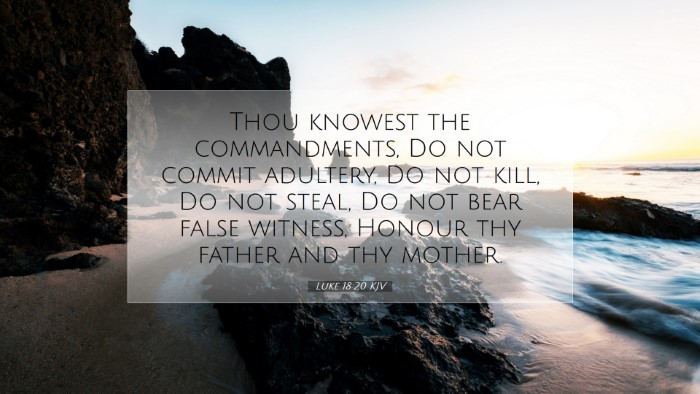Commentary on Luke 18:20
Verse: "Thou knowest the commandments, Do not commit adultery, Do not kill, Do not steal, Do not bear false witness, Honor thy father and thy mother."
Introduction
This verse is part of the rich narrative in which Jesus engages the rich young ruler (or the rich young man) who approaches Him seeking eternal life. The significance of the commandments cited in this verse is profound as they reveal both the moral law given by God and the heart of the inquiry about salvation. This commentary combines insights from the respected public domain commentaries of Matthew Henry, Albert Barnes, and Adam Clarke to provide a thorough exploration of its implications.
The Context of the Commandments
In this significant encounter, the rich young ruler shines a light on the human condition concerning moral failure and the quest for righteousness. This verse serves as a reminder of God's law and the ethical expectations placed upon individuals, especially those desiring a life anchored in faith.
Matthew Henry's Insights
According to Matthew Henry, the mention of the commandments serves both as a moral guide and as an indictment of human behavior. Henry emphasizes that Christ points to the commandments not merely to affirm the law but to highlight the man's superficial understanding and the deficiency in his righteous standing before God.
Albert Barnes's Perspective
Albert Barnes stresses the importance of the commandments in understanding the nature of sin. He reflects on how Jesus cites these commandments to stimulate reflection in the young man concerning his legalistic interpretations of righteousness. Barnes notes that while the young man claims to have kept these commandments from his youth, it demonstrates his ignorance of the true depth and spirit of the law.
Adam Clarke's Commentary
Adam Clarke delves into the theological implications of the commandments. He points out that Jesus’ recitation of the commandments was intentional, serving to remind the young ruler of the overarching call to love—both to love God and to love one's neighbor. Clarke argues that this division showcases the young man's reliance on external compliance rather than internal transformation.
The Ethical and Moral Implications of the Commandments
The commandments listed by Jesus reflect foundational moral truths, conveying God's standards for holy living. They guide believers in forming a moral compass rooted in love and respect for God and others.
- Do Not Commit Adultery: Emphasizes fidelity and the sanctity of marriage.
- Do Not Kill: Affirms the value of human life and the moral obligation to protect it.
- Do Not Steal: Stresses the importance of respecting others' possessions and rights.
- Do Not Bear False Witness: Calls for integrity and honesty in dealings.
- Honor Thy Father and Thy Mother: Highlights the importance of family and respect for parental authority.
Understanding Human Righteousness
The interaction between Jesus and the young ruler reveals the complexities surrounding human righteousness. Each commandment serves to challenge the young ruler's perception of his own moral standing.
Self-Righteousness vs. Genuine Righteousness
Henry elaborates that self-righteousness blinds individuals to their frailty and the reality of their need for grace. The rich young ruler exemplifies this, approaching Jesus with confidence in his law-keeping, yet failing to recognize that true righteousness extends beyond mere external adherence to commandments.
The Call to Something Greater
Barnes indicates that Jesus’ response calls the young man to understand the heart of the law—love and mercy—which transcends the letter. Emphasizing the need for more than legalistic observance reveals God’s desire for an internal transformation rather than mere external compliance.
Transformation and the Need for Change
Clarke points out that Jesus is urging the young ruler to rethink his approach to life—calling him to abandon his reliance on possessions for sustenance and fulfillment. Humanity's inclination towards idolatry and self-sufficiency often clouds the perception of true spiritual need.
Conclusion
Luke 18:20 serves as a potent reminder of God’s moral expectations and the human inclination to lean on self-perceived righteousness. The discourse between Jesus and the rich young ruler invites deeper reflection on the transformative power of faith, challenging every believer to move beyond a surface-level understanding of God's commandments to a richer, more profound relationship with Him. Through insights from Henry, Barnes, and Clarke, we see the call of Jesus as not just a list of do's and don'ts but as an invitation to experience true life in communion with God.
Reflective Questions
- How do the commandments reflect your own understanding of righteousness?
- What areas of your life may require a deeper transformation rather than mere adherence to rules?
- In what ways can we cultivate a heart that loves God and our neighbors more deeply?


